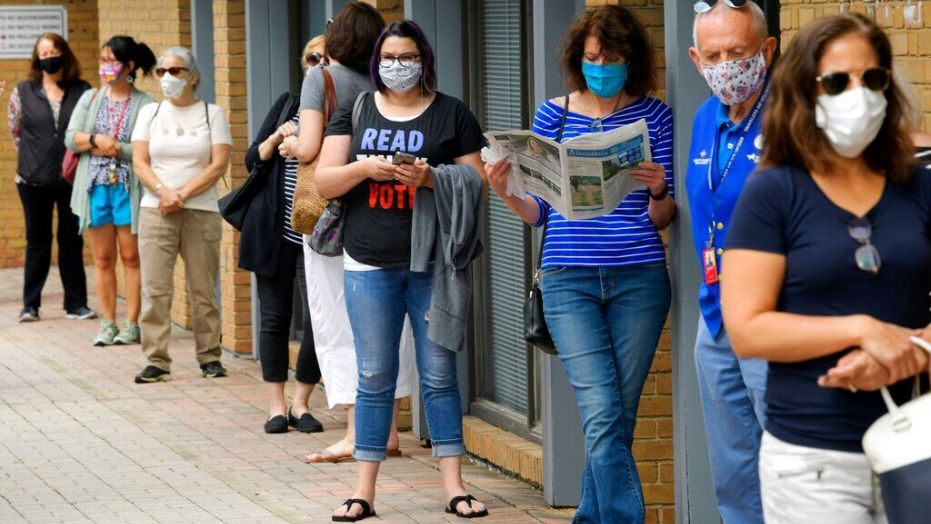Advertisement
A federal judge has ruled that a regulation that effectively barred many asylum seekers from obtaining protection in the United States violated federal law. It is the latest in a string of defeats.

WASHINGTON — A federal judge appointed by President Trump has ruled that the Trump administration must end a policy that effectively bars most Central American migrants fleeing poverty and persecution from obtaining asylum in the United States.
The asylum rule in question prevents migrants from gaining protection in the United States if they fail to first apply for protection in a country en route to the southwestern border. But Judge Timothy J. Kelly of the Federal District Court for the District of Columbia said late Tuesday night that the Trump administration illegally put in effect the rule by not allowing the public to weigh in. The administration had argued that allowing for a public comment period after announcing the rule would have prompted migrants to rush to the border, a claim Judge Kelly did not accept.
The ruling was only the latest in a string of defeats the Trump administration has been dealt by judges who decided that administration officials, in their haste to make policy, violated federal law laying out how regulations must be carried out or rolled back. The Supreme Court last month preserved Obama-era protections for about 700,000 young undocumented immigrants known as Dreamers, ruling that the administration had violated procedures in rolling back the rule.
In April, an effort to roll back nutrition standards for school meals championed by the former first lady Michelle Obama, was reversed on similar procedural violations. In the environmental arena, federal courts have found at least five times that the Trump administration violated the Administrative Procedures Act by skipping steps when it tried to delay conservation rules that had already taken effect.
The same factors may have cost the president his hard-fought rule to block asylum seekers.
“It’s notable in this case that Judge Kelly reiterated what other judges recently retorted to the administration: Do your homework,” said Claudia Cubas, the litigation director for the Capital Area Immigrants’ Rights Coalition, one of the plaintiffs in the lawsuit.
The Justice and Homeland Security Departments did not respond to requests for comment.
While the decision will immediately invalidate the rule demanding that asylum seekers apply for protection before arriving at the United States, it is unlikely to lead to a flood of asylum claims. The Trump administration has issued other overlapping policies that have effectively sealed the border to asylum seekers.
The federal government is currently citing the coronavirus pandemic and emergency health protections to rapidly return migrants to Mexico or their homes countries, preventing nearly all of them from seeking protection.
The Trump administration will also continue to use agreements made with Guatemala and Honduras to deport migrants who cross the border back to those Central American countries, where they would have to seek asylum from those governments.
“Should the border ever reopen, the government could simply use the asylum cooperative agreements to turn away everyone anyway,” said Aaron Reichlin-Melnick, the policy counsel for the American Immigration Council, an immigrant advocacy organization. “Of course, it is extraordinarily unlikely the Trump administration will lift the ban at the border through his first term in office.”
But immigration lawyers said the decision issued Tuesday would create some opportunities for migrants, including children, who had sought asylum in the United States after the rule was issued last July, including many who were forced to wait in Mexico while their hearings were delayed. With the rule in place, their asylum claims could have been rejected by a judge if they had not previously applied for asylum in another country en route. Now many of those migrants may be able to secure asylum in court.
“They will finally get a chance at asylum, something they should’ve got from the first get-go,” Ms. Cubas said.
The administration had moved forward with the policy after the Supreme Court in September lifted an injunction against it, allowing it to be enforced while the legal fights played out in the courts.
The Supreme Court had stepped in after federal judges in San Francisco and Washington issued conflicting rulings on the policy. Judge Jon S. Tigar of the Federal District Court in San Francisco had ordered the administration to continue accepting the migrants, saying the policy was inconsistent with existing asylum laws. But Judge Kelly in Washington had ruled that the plaintiffs would not face “irreparable harm” by the policy.
Once the stay was lifted, advocacy groups in the Washington case bolstered their filings by adding women and children who had fled persecution and violence in Central America, Cuba and Angola but had not applied for asylum before reaching the U.S. border. On Tuesday, Judge Kelly found that the administration’s excuse for not allowing the public to weigh in on the rule was not justified.
“After carefully examining the record, the court finds that it does not contain sufficient evidence,” Judge Kelly wrote.
Immigration lawyers were elated.
“We are thrilled that Judge Kelly has held the administration accountable for failing to follow longstanding procedural rules as it tries to eviscerate the asylum system,” said Keren Zwick, the director of litigation at the National Immigrant Justice Center. “The rule had a devastating impact on asylum seekers, and we are glad to see Judge Kelly clearly state that this administration is not above the law even as it tries to villainize refugees.”



